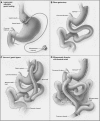Is Bariatric Surgery an Effective Treatment for Type II Diabetic Kidney Disease?
- PMID: 26450931
- PMCID: PMC4791822
- DOI: 10.2215/CJN.07670715
Is Bariatric Surgery an Effective Treatment for Type II Diabetic Kidney Disease?
Abstract
Type II diabetic kidney disease is devastating to patients and society alike. This review will evaluate bariatric surgery as a treatment for diabetic kidney disease primarily through its ability to induce and maintain regression of type II diabetes. The review begins by outlining the global challenge of diabetic kidney disease, its link to obesity, and the comparative benefits of bariatric surgery on weight and type II diabetes. It then surveys comprehensively the relevant literature, which reports that although bariatric surgery is associated with reductions in albuminuria, its effect on harder clinical end points like progression of diabetic kidney disease is not known. The review also includes a critical assessment of the risks and costs of bariatric surgery and concludes by acknowledging the major knowledge gaps in the field and providing research strategies to overcome them. Until these knowledge gaps are filled, clinicians will be forced to rely on their own subjective judgment in determining the benefit-risk ratio of bariatric surgery for patients with diabetic kidney disease.
Keywords: bariatric surgery; body weight; diabetes; diabetes mellitus; diabetic nephropathies; diabetic nephropathy; humans; obesity; treatment outcome; type 2.
Copyright © 2016 by the American Society of Nephrology.
Figures
References
-
- Friedman A: Implications and management of obesity in kidney disease. In: Nutrition in Kidney Disesae, edited by Byham-Gray L, Burrows J, Chertow G, New York, Springer, 2014
-
- Atkins RC, Zimmet P: Diabetic kidney disease: Act now or pay later. Kidney Int 77: 375–377, 2010 - PubMed
-
- US Renal Data System: USRDS 2014 Annual Data Report: Atlas of End-Stage Renal Disease in the United States, Bethesda, MD, National Institutes of Health, National Institute of Diabetes and Digestive and Kidney Diseases, 2014
Publication types
MeSH terms
LinkOut - more resources
Full Text Sources
Medical


